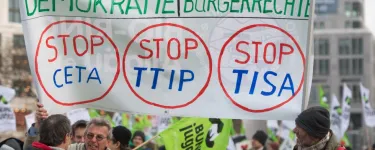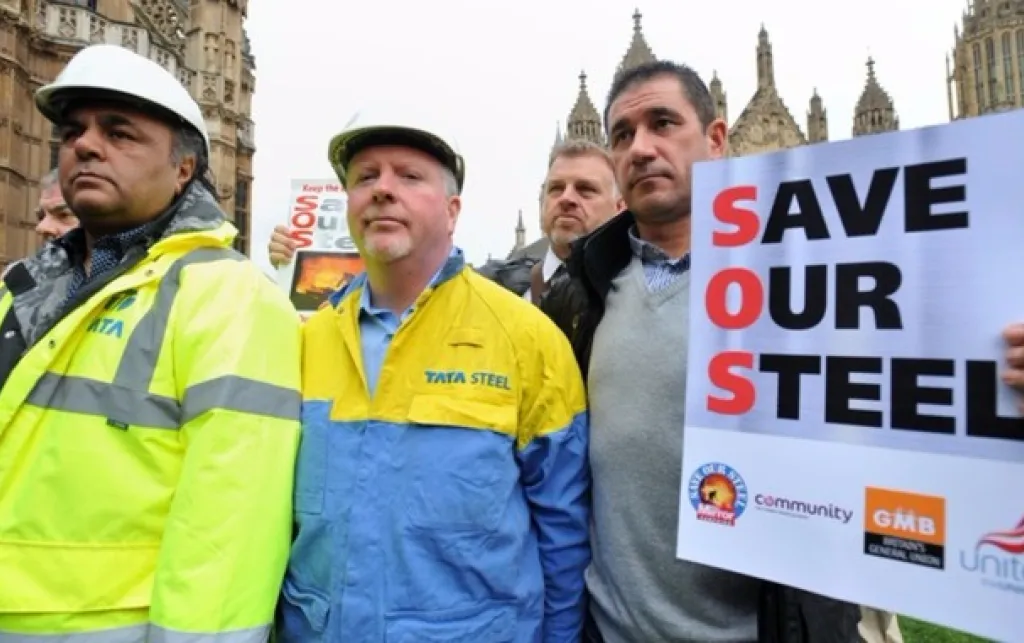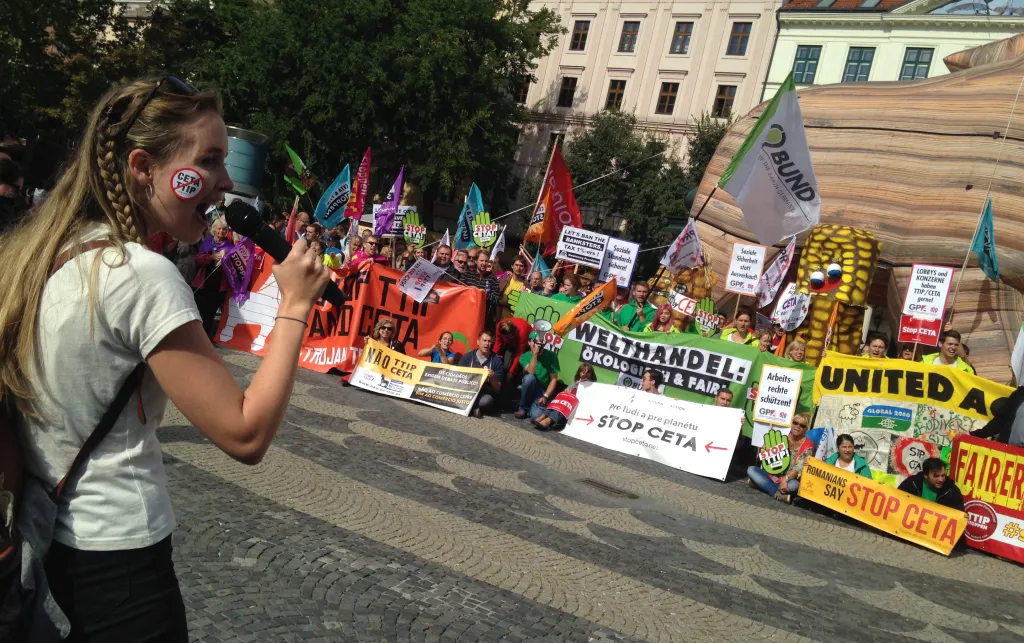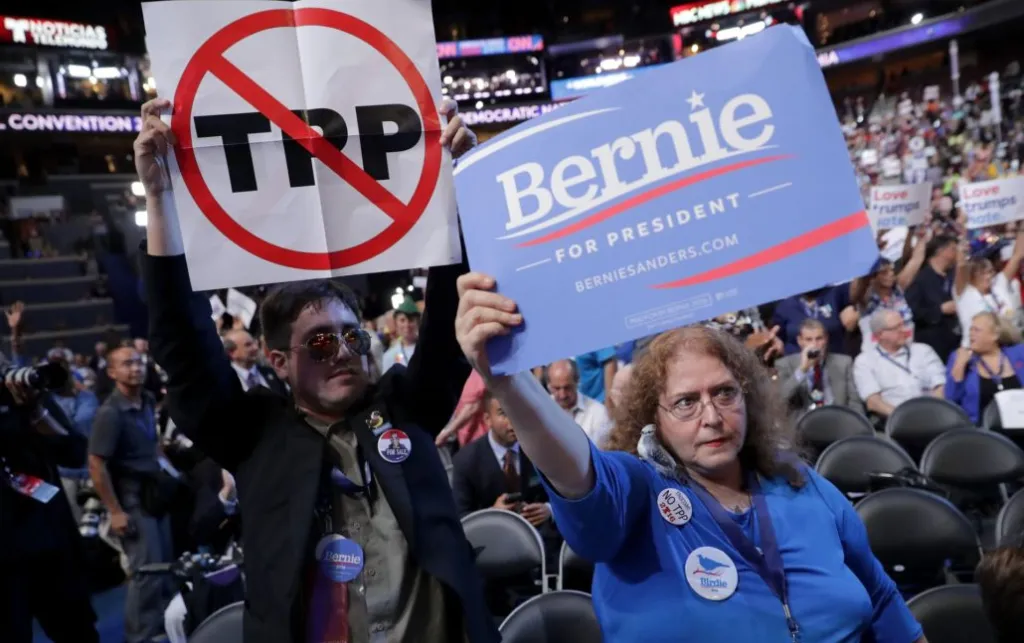Campaigning for Trade Justice in 2016: TTIP, CETA, Brexit and Trump

January: Rough trade
2016 kicked off with a TTIP debate held at the School of Oriental and African Studies. Our trade campaigner joined a panel chaired by BBC Economics Correspondent Andrew Walker, alongside House of Lords TTIP adviser Prof Denis Novy, Emmanuel Adam of lobby group, British American Business, and former Green Party leader Natalie Bennett. Trade debates, just like trade deals, produce winners and losers: listen for free here.
In line with our support for Business Against TTIP, a coalition of UK small business owners, we launched the report Rough Trade: The threat of TTIP to small businesses in the UK. We demonstrated how claims that TTIP will help small businesses are nothing more than spin: TTIP is, and always has been, by and for big business.
Amid all the focus on TTIP, we highlighted that members of the European Parliament (MEPs) voted to continue secret negotiations on yet another corporate-authored deal: TiSA, the Trade in Services Agreement.
February: UK has lost a corporate court case
A freedom of information request we made revealed that the UK has lost an ISDS ‘corporate court’ case: the UK was forced to pay out for costs caused by migrants gaining access to the Channel Tunnel, and the government tried to cover it up when questioned about it in parliament. Meanwhile, the European Commission brought ISDS corporate courts back into the TTIP negotiations two years after a resounding defeat in a Commission consultation on the issue. We joined 280 civil society groups across Europe, the USA and Canada to condemn the move.
In February, we also highlighted the links between TTIP and its agenda of controlling world trade – to the detriment of the poorest countries. We went to Poland – where we made national news - to speak at events focused on trade and international development, before joining a discussion at the University of London focused on the same issue (you can listen free here).
March: Save Our Steel!
The UK steel industry grabbed news headlines in March as Tata steel announced it would sell its entire UK business, threatening some 15,000 jobs. While the government painted itself as on the side of UK steel, the projected impacts of TTIP on UK metals told a very different story.

April: Obama arrives, protestors await
War on Want held its annual conference in April, with TTIP, CETA and Brexit all high up the agenda. Alongside our former War on Want director John Hilary and trade campaigner Mark Dearn, Green MEP Jean Lambert and academic Marina Prentoulis of Another Europe is Possible joined a session focused on trade deals and what they mean for the UK and its relationship with EU and the rest of the world.
Barack Obama, who first announced TTIP, visited the UK in April as part of a trip to Europe – however, his support for TTIP was undermined by France threatening to derail the deal, 130,000 people signing a TTIP petition to Obama in the UK, and tens of thousands of TTIP protestors greeting Obama in Hannover, Germany. The protests matched polling showing plummeting support for TTIP in Germany and the USA, which we analysed in this radio interview. By the end of the month, parliaments in the Netherlands and Belgium passed motions opposing CETA.
The attention of the Labour Party focused on TTIP’s impact on Southern countries as Diane Abbott argued that “the trade deal will put corporations in control”.
May: #TTIPLeaks
May was a huge month in TTIP campaigning as leaked TTIP documents reached the hands of activists and campaigners. We were at the heart of the “#TTIPLeaks” media storm with this Independent article by former War on Want director John Hilary shared a stunning 100,000 times. The leaks led many to predict the demise of the deal. As we continued to highlight TTIP’s agenda for the global South, we co-hosted a seminar on the issue with the Ramphal Institute at King’s College London. You can access a special selection of articles put together for the conference here.
Maude Barlow of the Council of Canadians was a special guest of War on Want in May: she joined War on Want and UK allies as we protested CETA on the streets of London, before holding an evening panel discussion on CETA and its threat to Europe and the UK. The event coincided with the publication of our new briefing on CETA.

June: Brexit
The EU referendum loomed large all through June, with TTIP and CETA entering the debate on both sides. While we highlighted what trade deals like TTIP told us about the pro-corporate agenda of EU institutions, at the same time we reminded people that escaping the EU doesn’t mean escaping TTIP’s global agenda.
And those corporate forces didn’t let up for the referendum, as a new coalition – led by the likes of TheCityUK, British American Business and The Institute of International Bankers - was created to lobby for financial deregulation through TTIP.
War on Want believes this is setting us up for another financial crisis. As the architect of America's Dodd-Frank Act argues, TTIP will serve as a "one-way ratchet to pull back from [financial] reforms".
July: Building for trade justice
In the aftermath of Brexit, we analysed how and why we must use Brexit to ensure trade justice for the UK and the rest of the world: we published this analysis of Brexit and trade justice, and joined Students Against TTIP and Global Justice Now for a London event focused on how we can advance the movement for trade justice after Brexit. While a member of the EU, the UK has been without its own national trade policy for 40 years – but we explained in the Independent how TTIP tells us a lot about the current government’s trade agenda.
There was a humiliating defeat for the European Commission on CETA, as the EU’s member states decided that the deal must be voted on by national parliaments before all of it (especially corporate courts) can be put in place. More than 13,000 War on Want members and supporters joined the public pressure across Europe that was central to this critical campaign win. In early 2017, we’ll find out if this same principle will be applied to all future EU trade deals.
August: CETA's recipe for disaster
We joined with allies including the Council of Canadian, Transnational Institute and Friends of the Earth to release a report on CETA’s impact on food safety. We also teamed up with organisations across Europe to write a letter calling for specialist European Parliament committees to be permitted to give opinions on CETA – this issue was to have big consequences later in the year.
Highlighting just how much corporate courts have captured public interest and opposition, leading ‘social news’ outlet BuzzFeed published an in-depth, two-part investigation into ISDS corporate courts.

September: 'CETA Without Blinders'
CETA will be bad for EU workers – that was the clear message in September. First, the 'CETA Without Blinders' report modelled CETA's economic impacts, highlighting jobs lost across Europe, less money for workers and higher inequality. Then MEPs on the EU trade committee admitted their concerns over CETA, citing public services, workers’ rights and the deal’s ‘corporate court’ system.
Meanwhile, in Austria, polling showed overwhelming opposition to the deal, adding to concerns in Belgium, the Netherlands, Slovenia, Germany and Poland.
October: CETA blocked, then signed
October was a month of high drama for CETA, as the deal was blocked one moment, on again the next, before finally being signed - but yet to be voted on by the European Parliament – at the end of the month. The European Commission and Canada made a series of desperate – and hollow - compromises to appease opposition from the Belgium. We travelled to Bratislava, Slovakia, joining groups across Europe in protests at meetings between Canada and the Commission.
The Belgian region of Wallonia joined others in preventing a Belgian signature – Wallonia raised concerns with the European Commission a year earlier but never heard back. Its seven day timeline to examine a ‘declaration’ on CETA was called “an unacceptable violation of our democratic principles” by Minister-President Paul Magnette.

Elsewhere, Germany’s constitutional court ruled that it must be able to stop CETA at any time during its initial application – mirroring a concession won by Belgium. And there were farcical scenes in Brussels as the European Commission decided to keep its documents on the legality of secret courts … secret. It now faces a (non-secret) court case from Client Earth.
Back in the UK, Liam Fox appeared before the European Scrutiny Committee, apologising and admitting intentionally sidestepping parliamentary scrutiny to sign the UK up to CETA - earlier in the month, he told the Conservative Party Conference of his support for TTIP and CETA, as we explained on Politics.co.uk.
November: Trump and trade wars
There was another political shock in November as Donald Trump won the US presidency. Trump repeatedly stated opposition to the TPP during his election campaign,while also highlighting deals like NAFTA. We joined allies including Unite, Unison, the GMB and Global Justice Now to write a letter published in the Guardian on Donald Trump and trade deals: “To defeat the politics of racism and hatred represented by Trump and the far right in Europe, we call on politicians to support economic policies that will benefit the majority of people, eradicate poverty, create decent jobs and good public services and halt climate change. The first step politicians in Europe must take is to vote to stop CETA in the coming weeks.”
We joined the BBC World Service Newshour show to talk Trade Wars: the End of Globalisation, a wide-ranging debate covering TTIP and the TPP, Donald Trump and globalisation in general.

December: CETA threat to jobs spelled out
In a major blow to CETA, an EU committee backed up what many trade unions and civil society groups have been saying all along: CETA is bad news for workers. As we explained in the Independent, the European Parliament Employment and Social Affairs Committee’s finding that CETA will increase inequality came just as research highlighted high levels of inequality across the EU. Soon after, the European Trade Union Confederation (ETUC) said that it too believes CETA is bad for workers and it will be calling on MEPs to vote against the deal.


